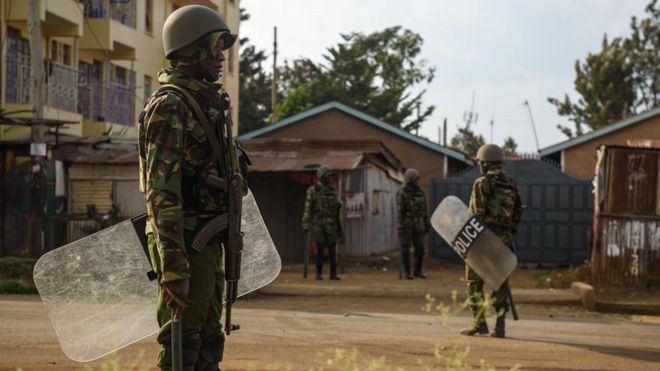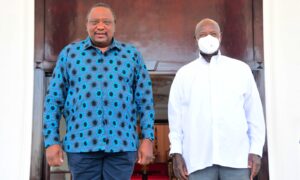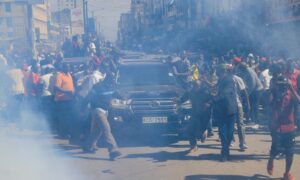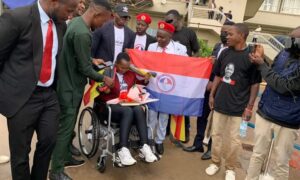
Protesters and police in Kenya have clashed after the leader of the opposition claimed he was cheated of victory by a hacking attack that he said manipulated the results in the country’s presidential election.
Raila Odinga, the leader of the National Super Alliance, said election commission computer systems and databases were tampered with overnight to “create errors” in favour of rival candidate Uhuru Kenyatta, who has been in power since 2013.
Odinga urged his supporters to remain calm, but added: “I don’t control the people.”
“You can only cheat the people for so long,” he said. “The 2017 general election was a fraud.”
With ballots from 96% of polling stations counted, results released by Kenya’s electoral commission show Kenyatta leading with 54.4% of the vote, against Odinga’s 44.8%, a difference of 1.4 million votes.
The elections seen as a key test of the stability of one of Africa’s most important countries.

Riot policemen have been out in the streets of Kisumu, an opposition stronghold
Across most of the country streets were empty, most businesses remained shut and an uneasy calm prevailed. The violent incidents were limited, raising hopes that Kenya may avoid a major breakdown of law and order.
In the western city of Kisumu police fired teargas at a group of 100 opposition supporters who had been chanting: “No Raila, no peace.”
Protests were also held in the poor Nairobi neighbourhood of Mathare, an Odinga stronghold.
At about 2pm, two young men were killed and five injured when police opened fire on demonstrators who had blocked a road, a witness told the Guardian.
Japheth Koome, Nairobi police chief, said the men who had been shot were thieves.
Kenya goes to the polls in closely contested election – in pictures

Scattered clashes in Mathare continued throughout the afternoon, with groups of youths hurling rocks at police who responded with teargas.
“We want them to hear. They won’t hear us shouting. So we will use stones. We know our rights and they can’t kill us all,” said Kevin Odhiambo, a 25-year-old carpenter in Mathare.
But others from the neighbourhood branded the protesters “troublemakers”.
A third death occurred when police opened fire in Kisii county, 300km west of the capital.
Kenya Railways suspended operations of trains on its recently launched line from Mombasa to Nairobi – a flagship infrastructure project – until further notice.
Advertisement
In 2007, Odinga’s angry rejection of the result in an election marred by irregularities prompted rioting and retaliation by security forces that tipped the country into its worst crisis for decades. About 1,200 people were killed in the ethnic violence that followed.
Odinga, a polarising figure who was making his fourth bid for power, also claimed that the murder of a senior election official last week was linked to the alleged hacking attack. Chris Msando, the election commission’s head of IT, was found strangled and tortured in a forest on the outskirts of Nairobi.
Odinga, 72, said Msando’s identity and log-ins had been used to access key computer servers by those behind the rigging attempt.
The EU observer mission declined to comment on Odinga’s claims, which election officials have said they will investigate. “We will come up with a methodology to verify the allegations made on hacking,” said Waguma Chebukati, the chair of the electoral commission. “For now, I cannot say whether or not the system has been hacked.”
The Kenya human rights commission – a well-known non-governmental organisation – said it had discovered some discrepancies in an initial comparison between provisional results announced by the election commission and paper forms signed at polling stations by party agents.
In coming days, election officials will present more forms allowing further scrutiny of the results.
Many Kenyans say a repeat of the violence of 2007 is unlikely as the country has learned from the traumatic experience. One voter told the Guardian during polling that younger citizens wanted “peace, peace, peace”.
In 2013, Odinga also rejected defeat. He took his fight to the courts and lost.
Odinga supporters interviewed in recent days said they would not take to the streets if they believed they had been fairly defeated, though they insisted their leader had been robbed of victory during the last two polls.
“There won’t be any problems if the process is fair and transparent, but if it is being rigged there’ll be chaos,” said Paul Ouma, a bus company manager, before the poll.
Young men in Mathare predicted that “life would never be the same again” if the opposition lost. “People will fight … it will have been stolen,” said Brian Aswani.
In Kibera, another poor neighbourhood where Odinga is popular, young men said they would wait for their leader’s decision. “If we lose, then we will wait for our leader Raila [Odinga] to speak. If he says it is OK, then it is OK. If he says fight, we will fight,” said Abraham Ashidiva, 24.
Odinga, 72, is the son of Kenya’s first vice-president. He is an ethnic Luo from the west, an area that has long felt neglected by the central government and resentful of its perceived exclusion from power.
Kenyatta, the 55-year-old son of the first president, Jomo Kenyatta, is a Kikuyu, the ethnic group that has supplied three of the four presidents since independence from Britain in 1963.
On Tuesday, Kenyatta called on whoever lost to concede. “In the event that they lose, let us accept the will of the people. I am willing myself to accept the will of the people, so let them too,” Kenyatta said as he voted at the Mutomo primary school in Gatundu, about 20 miles north of the capital.
Later, Odinga told the German broadcaster Deutsche Welle that he would accept defeat “in the unlikely event that I lost fairly”.
To win the election, a candidate needs one vote more than 50%, and at least a quarter of the vote in 24 of Kenya’s 47 counties.
In addition to a new president, Kenyans are electing regional politicians after a 2010 constitution devolved power and money to the counties.
Observers see the election as the last confrontation of the dynastic rivalry between the families of Kenyatta and Odinga, which has lasted more than half a century. The presidential candidates’ fathers, Jomo Kenyatta and Jaramogi Odinga, went from allies in the struggle for independence from Britain to bitter rivals.
The Guardian




























